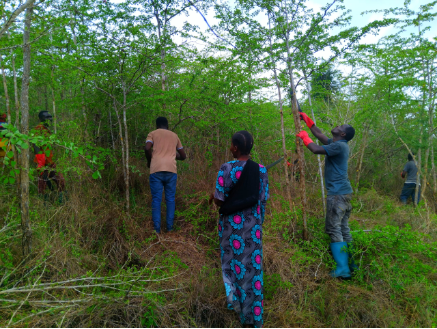
Tropical forests are among the most vital ecosystems for capturing and storing carbon dioxide (CO2), helping mitigate the effects of climate change by absorbing vast amounts of greenhouse gases. However, Tanzania’s forests have been heavily impacted by deforestation due to illegal logging, agricultural expansion, and other human activities, contributing to increased CO₂ levels and biodiversity loss. To counteract this, urgent reforestation efforts are underway. Our project “Promoting participatory and ambitious National Determined Contribution implementation through nature-based solutions in rural and coastal landscapes of Tanzania” (PRO-NDC-ACT). The project aims to restore Tanzania's forests, promote ecosystem resilience, and bolster the country’s climate goals through sustainable, nature-based solutions. It is funded by the International Climate Initiative of the German Federal Ministry for Economic Affairs and Climate Action.
Last year we established three tree nurseries in Kigurusimba and Msaraza Village in Pangani District and Vumari Village in Same District. Since then the local communities have put great efforts in these tree nurseries. During our most recent activities from 14 October to 27 October 2024, we were able to plant 3200 saplings near the riverline in Vumari Village Forest Reserve. After a few days of rain, the conditions for planting riverine saplings were ideal. But the focus of our activities was laid on weeding and Farmer Managed Natural Regeneration.
Community-Led Weeding for Better Tree Growth
As afforestation does not end with planting seedlings, it needs continuous care for young saplings. After being planted, seedlings develop a larger root system and multiple sets of leaves and branches and become saplings. However, they face resource competition against other fast-growing plants. Clearing these fast-growing weeds around newly planted saplings is essential for young trees to receive enough light, water, and nutrients to thrive. Furthermore, it enhances root development and prevents disease and pest infestation. Therefore, weeding needs to be conducted during the first 1.5 to 2 years after planting.
Expanding Tree Cover with Farmer Managed Natural Regeneration (FMNR)
Restoring our forests is not only built on afforestation but also on natural regeneration. In Kigurusimba Village and Vumari Village, training sessions were conducted for local communities on performing Farmer-Managed Natural Regeneration (FMNR), a sustainable approach that supports natural regrowth from existing tree stumps and roots. Participants demonstrated a clear understanding of the activities' modalities and performed effectively. It involves species selection and pruning of the trees to remove side branches, threat for trees to grow and reduce competition among the trees. FMNR plays a critical role in restoring degraded areas by utilizing local knowledge and community involvement to encourage regrowth. It helps to boost tree cover and biodiversity without requiring additional planting. During the project period, the community assessed previously treated areas and initiated additional FMNR interventions as needed, fostering a robust, self-sustaining ecosystem.
